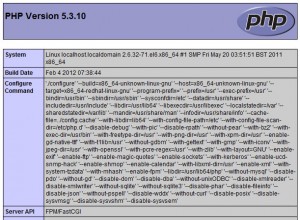怎么在CentOS 6上通过YUM安装Nginx和PHP-FPM
如何在CentOS 6上通过YUM安装Nginx和PHP-FPM
原文地址:http://www.lifelinux.com/how-to-install-nginx-and-php-fpm-on-centos-6-via-yum/
开始安装Nginx和PHP-FPM之前,你必须卸载系统中以前安装的Apache和PHP。用root登录输入下面的命令:
增加额外资源库
默认情况下,CentOS的官方资源是没有php-fpm的, 但我们可以从Remi的RPM资源中获得,它依赖于EPEL资源。我们可以这样增加两个资源库:
输出样例
安装Nginx
输入下列命令
输出样例
如果你想在系统启动时自动运行nginx,输入下列命令:
第一次启动nginx,输入下列命令:
输出样例
安装PHP-FPM
输入下列命令:
输出样例
如果你想在系统启动时自动运行php-fpm,输入下列命令:
PHP仅安装了核心模块,你很可能需要安装其他的模块,比如MySQL、 XML、 GD等等,你可以输入下列命令:
第一次启动php-fpm,输入下列命令:
输出样例
配置PHP-FPM和Nginx,让他们一起工作
nginx的配置文件在/etc/nginx/nginx.conf,输入下列命令编辑这个文件:
像下面这样编辑取消注释:
重启Nginx会重新读取配置文件,输入
现在在document root目录下建立下列PHP文件
文件内容如下:
访问 http://YOUR-SERVER-IP

Nginx虚拟主机设置
设置例子
IP: 192.168.1.113
Domain: domain.local
Hosted at: /home/www/domain.local
输入下列命令新建名叫“www”的用户
创建必要的目录
创建虚拟主机配置文件
输入下面命令打开www.conf文件
增加以下配置
你可以用下列方法检查配置文件是否有语法错误
输出样例
现在编辑/etc/php-fpm.d/www.conf文件,将运行php-fpm进程的用户改为“www”,输入
找到“group of processes”,编辑成下面的样子:
最后重启nginx

Hot AI Tools

Undresser.AI Undress
AI-powered app for creating realistic nude photos

AI Clothes Remover
Online AI tool for removing clothes from photos.

Undress AI Tool
Undress images for free

Clothoff.io
AI clothes remover

Video Face Swap
Swap faces in any video effortlessly with our completely free AI face swap tool!

Hot Article

Hot Tools

Notepad++7.3.1
Easy-to-use and free code editor

SublimeText3 Chinese version
Chinese version, very easy to use

Zend Studio 13.0.1
Powerful PHP integrated development environment

Dreamweaver CS6
Visual web development tools

SublimeText3 Mac version
God-level code editing software (SublimeText3)

Hot Topics
 PHP's Purpose: Building Dynamic Websites
Apr 15, 2025 am 12:18 AM
PHP's Purpose: Building Dynamic Websites
Apr 15, 2025 am 12:18 AM
PHP is used to build dynamic websites, and its core functions include: 1. Generate dynamic content and generate web pages in real time by connecting with the database; 2. Process user interaction and form submissions, verify inputs and respond to operations; 3. Manage sessions and user authentication to provide a personalized experience; 4. Optimize performance and follow best practices to improve website efficiency and security.
 PHP and Python: Different Paradigms Explained
Apr 18, 2025 am 12:26 AM
PHP and Python: Different Paradigms Explained
Apr 18, 2025 am 12:26 AM
PHP is mainly procedural programming, but also supports object-oriented programming (OOP); Python supports a variety of paradigms, including OOP, functional and procedural programming. PHP is suitable for web development, and Python is suitable for a variety of applications such as data analysis and machine learning.
 PHP and Python: Code Examples and Comparison
Apr 15, 2025 am 12:07 AM
PHP and Python: Code Examples and Comparison
Apr 15, 2025 am 12:07 AM
PHP and Python have their own advantages and disadvantages, and the choice depends on project needs and personal preferences. 1.PHP is suitable for rapid development and maintenance of large-scale web applications. 2. Python dominates the field of data science and machine learning.
 Choosing Between PHP and Python: A Guide
Apr 18, 2025 am 12:24 AM
Choosing Between PHP and Python: A Guide
Apr 18, 2025 am 12:24 AM
PHP is suitable for web development and rapid prototyping, and Python is suitable for data science and machine learning. 1.PHP is used for dynamic web development, with simple syntax and suitable for rapid development. 2. Python has concise syntax, is suitable for multiple fields, and has a strong library ecosystem.
 PHP: Handling Databases and Server-Side Logic
Apr 15, 2025 am 12:15 AM
PHP: Handling Databases and Server-Side Logic
Apr 15, 2025 am 12:15 AM
PHP uses MySQLi and PDO extensions to interact in database operations and server-side logic processing, and processes server-side logic through functions such as session management. 1) Use MySQLi or PDO to connect to the database and execute SQL queries. 2) Handle HTTP requests and user status through session management and other functions. 3) Use transactions to ensure the atomicity of database operations. 4) Prevent SQL injection, use exception handling and closing connections for debugging. 5) Optimize performance through indexing and cache, write highly readable code and perform error handling.
 How to check the name of the docker container
Apr 15, 2025 pm 12:21 PM
How to check the name of the docker container
Apr 15, 2025 pm 12:21 PM
You can query the Docker container name by following the steps: List all containers (docker ps). Filter the container list (using the grep command). Gets the container name (located in the "NAMES" column).
 Why Use PHP? Advantages and Benefits Explained
Apr 16, 2025 am 12:16 AM
Why Use PHP? Advantages and Benefits Explained
Apr 16, 2025 am 12:16 AM
The core benefits of PHP include ease of learning, strong web development support, rich libraries and frameworks, high performance and scalability, cross-platform compatibility, and cost-effectiveness. 1) Easy to learn and use, suitable for beginners; 2) Good integration with web servers and supports multiple databases; 3) Have powerful frameworks such as Laravel; 4) High performance can be achieved through optimization; 5) Support multiple operating systems; 6) Open source to reduce development costs.
 How to configure nginx in Windows
Apr 14, 2025 pm 12:57 PM
How to configure nginx in Windows
Apr 14, 2025 pm 12:57 PM
How to configure Nginx in Windows? Install Nginx and create a virtual host configuration. Modify the main configuration file and include the virtual host configuration. Start or reload Nginx. Test the configuration and view the website. Selectively enable SSL and configure SSL certificates. Selectively set the firewall to allow port 80 and 443 traffic.






